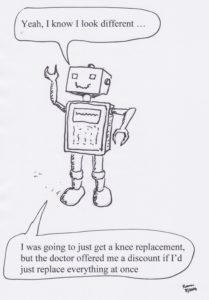Obedience even before much faith—Exodus 4:18-21
God’s signs had put the fear of God in Moses, enough to make him obey. But Moses’s obedience is still half-hearted, and (as will become obvious in the next lesson) incomplete.
After receiving this astonishing commission and these signs from God, Moses returns to his father-in-law and asks permission to go visit his siblings in Egypt (Exod 4:18). Moses owes respect to his father-in-law (e.g., 18:7), and it was respectful not to take leave of one’s family service prematurely (Jethro is a much friendlier in-law to Moses than was Laban the Aramean to Jacob; Gen 31:27-31). Did Jethro by now (vs. Exod 2:19) understand that Moses was an Israelite rather than an Egyptian? It may not have made a difference, but certainly by Exodus 18:1 Jethro knows, so it is not unlikely that he understood this earlier.
While Moses dare not disobey this God who called him, however, he says nothing to Jethro about God’s commission. He is still half-hearted, not knowing what will happen in Egypt. He says he wants to go to see if his relatives are alive (4:18). (His concern as to whether his relatives remain alive may also be legitimate; Moses is about eighty in this narrative, and his brother and sister are even older; 7:7. Many Israelites Moses knew may have by now passed away.)
Possibly a more urgent concern regarding survivors of his generation is whether those who wanted him killed are still alive. Thus, before Moses leaves Midian, the Lord again calls him to return to Egypt, informing him those who had sought his life are now dead (4:19).
Yet the Lord does not make Moses’s calling easier at this point by watering down what Moses will face. In fact, he warns him up front what he is in for. God will harden Pharaoh’s heart (4:21) and Moses is to warn Pharaoh that God will kill Pharaoh’s son for his disobedience (4:23). One needs little imagination to envision how Pharaoh, who fancied himself divine, would take an ultimatum and threat from the god of his slaves.
What God calls us to do often leads through serious hardships. Our hearts may not even be in his calling at first. That can be true whether we are thinking of God’s calling for all of us to make disciples, or of more specific aspects of our calling. But God has a plan, and one dare not disregard God’s commands—as Moses will soon discover. Confronting Pharaoh may be dangerous, but disobeying God nearly gets Moses killed (4:24).
Jobs at the campus post office
Indonesian lecture on reliability of the Gospels, session 1.4
15 minutes (historical reliability), plus some questions and answers (miracles, etc.)
How do you trust God yet fear him?
Biblical humility is closely related to the fear of the Lord (Prov 15:33; 22:4). Recognizing how great God is devastates our own pretensions to greatness. Then we cannot depend on our merit or status but depend solely on God and what He has done for us in Christ.
Term paper
Indonesian lecture on reliability of the Gospels, session 1.3
18.47 minutes, with English and Indonesian
The staff of Moses becomes the staff of God—Exodus 4:2, 17, 20
If you’re like me, maybe you have thought, “God healed people in the Bible, but is there any precedent for praying for stalled cars or frozen computer screens?” Perhaps it’s only some of us who are very picky who think that way, since the Bible offers much more general promises of prayer. And I have seen God answer prayer for stalled cars; such a prayer once even saved the life of my brother-in-law when he was fleeing war.
Look what God chose to do through a shepherd’s staff (4:17). There was nothing special about a shepherd’s staff per se. God meets us where we are, and uses us where we are. For an ancient shepherd, he might use our staff or sling; today he might use airplanes or computers. (If the power grid goes down and we can’t use computers, I think that maybe I did save my old manual typewriter.) My point is just that whatever is at hand, God can use it. God uses Peter’s shadow (Acts 5:15-16) and Paul’s face cloths (used to wipe off perspiration while he was working and maybe snatched without him knowing!—Acts 19:12). God isn’t limited to what he can use—or whom he can choose. Moses’s own staff (4:2, 17) becomes the staff of God (4:20).
I might joke about Moses’s staff (with puns that probably work only in English), but the Bible has a very serious message for us. God can work through instruments that could do nothing on their own. What matters is that God is with us.
(For other posts on Exodus, see http://www.craigkeener.org/category/old-testament/exodus/.)
Replacement therapy
How I came to Asbury, why I write books, etc.
Asbury recently filmed me for this 12-13 minute video interview:




